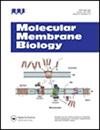Zinc uptake in the Basidiomycota: Characterization of zinc transporters in Ustilago maydis.
Q3 Biochemistry, Genetics and Molecular Biology
引用次数: 11
Abstract
Abstract At present, the planet faces a change in the composition and bioavailability of nutrients. Zinc deficiency is a widespread problem throughout the world. It is imperative to understand the mechanisms that organisms use to adapt to the deficiency of this micronutrient. In the Ascomycetes fungi, the ZIP family of proteins is one of the most important for zinc transport and includes high affinity Zrt1p and low zinc affinity Zrt2p transporters. After identification and characterization of ZRT1/ZRT2-like genes in Ustilago maydis we conclude that they encode for high and low zinc affinity transporters, with no apparent iron transport activity. These conclusions were supported by the gene deletion in Ustilago and the functional characterization of ZRT1/ZRT2-like genes by measuring the intracellular zinc content over a range of zinc availability. The functional complementation of the S. cerevisiae ZRT1Δ ZRT2Δ mutant with U. maydis genes supports this as well. U. maydis ZRT2 gene, was found to be regulated by pH through Rim101 pathway, thus providing novel insights into how this Basidiomycota fungus can adapt to different levels of Zn availability.担子菌门对锌的吸收:玉米黑鱼体内锌转运蛋白的特性。
目前,地球面临着营养成分和生物利用度的变化。缺锌是全世界普遍存在的问题。必须了解生物体用来适应这种微量营养素缺乏的机制。在子囊菌门真菌中,ZIP蛋白家族是锌转运最重要的蛋白之一,包括高亲和力Zrt1p和低锌亲和力Zrt2p转运蛋白。在鉴定和表征了玉米乌鱼中的ZRT1/ZRT2样基因后,我们得出结论,它们编码高和低锌亲和力转运蛋白,没有明显的铁转运活性。Ustilago的基因缺失和ZRT1/ZRT2样基因的功能表征支持了这些结论,通过测量锌有效性范围内的细胞内锌含量。酿酒酵母ZRT1ΔZRT2Δ突变体与玉米赤霉基因的功能互补也支持这一点。U.maydis ZRT2基因被发现通过Rim101途径受pH调节,从而为这种担子菌门真菌如何适应不同水平的锌有效性提供了新的见解。
本文章由计算机程序翻译,如有差异,请以英文原文为准。
求助全文
约1分钟内获得全文
求助全文
来源期刊

Molecular Membrane Biology
生物-生化与分子生物学
CiteScore
4.80
自引率
0.00%
发文量
0
审稿时长
>12 weeks
期刊介绍:
Cessation.
Molecular Membrane Biology provides a forum for high quality research that serves to advance knowledge in molecular aspects of biological membrane structure and function. The journal welcomes submissions of original research papers and reviews in the following areas:
• Membrane receptors and signalling
• Membrane transporters, pores and channels
• Synthesis and structure of membrane proteins
• Membrane translocation and targeting
• Lipid organisation and asymmetry
• Model membranes
• Membrane trafficking
• Cytoskeletal and extracellular membrane interactions
• Cell adhesion and intercellular interactions
• Molecular dynamics and molecular modelling of membranes.
• Antimicrobial peptides.
 求助内容:
求助内容: 应助结果提醒方式:
应助结果提醒方式:


